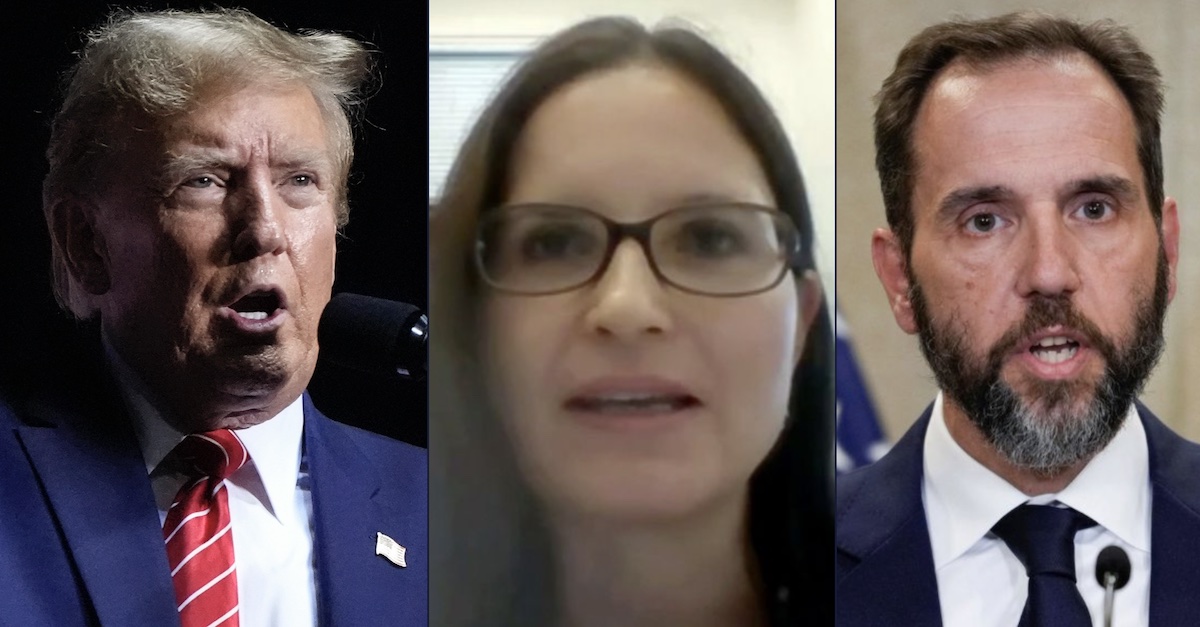
Left: Donald Trump (AP Photo/Mike Stewart, File). Center: U.S. District Judge Aileen Cannon (U.S. Senate). Right: Special counsel Jack Smith (AP Photo/J. Scott Applewhite, File).
In yet another almost-replay of the arguments made before the lower court in Donald Trump’s long-stalled-out Mar-a-Lago case, a group of law professors, legal scholars and a public interest law firm are asking the 11th Circuit Court of Appeals to let them file a brief as amici curiae (“friends of the court”) — on the defendant’s behalf.
On Tuesday, South Texas College of Law Professor Josh Blackman and Florida lawyer Michael Adam Sasso argued that legal scholar and Professor Seth Barrett Tillman, former prosecutor Robert W. Ray, and the conservative Landmark Legal Foundation should be allowed their say as special counsel Jack Smith looks to reanimate the prosecution.
In a motion for leave to file their brief, the attorneys say it is effectively their clients’ turn to catch the court’s ear — because two groups of pro-prosecution amici were allowed to file their own briefs late last month. And, they argue, this is not entirely unlike déjà vu: U.S. District Judge Aileen Cannon allowed all three groups to file briefs in the lower court case and she seriously considered each group during oral arguments.
“These amici advanced arguments that supplemented the positions taken by the Special Counsel and the Defendants,” the motion reads. “The District Court’s order cited these three amici. Now, as this case continues on appeal, assistance from amici continues. The constitutional lawyers have already filed their brief. And the Ray-Tillman-Landmark Amici now seek leave to file a brief.”
In their late September briefs, the pro-prosecution amici argued for the appellate court to reverse the dismissal of the Mar-a-Lago prosecution and for the case to be reassigned to another jurist.
In July, after “careful study,” Cannon threw out the case by finding U.S. Attorney General Merrick Garland had unlawfully appointed Smith as special counsel. She favorably cited several sections of Justice Clarence Thomas’ concurrence in Trump’s Supreme Court immunity case.
While Smith has not tried to have Cannon removed, the pro-prosecution amici cited several reasons related to the pace of the case and access to certain information in their effort.
More Law&Crime coverage: Mar-a-Lago judge allows former Scalia clerk, law professor, and attorney for anti-Trump coalition to argue in court over Jack Smith’s power to prosecute
The pro-Trump amici, however, largely sidestep the issue of Judge Cannon continuing on the case one way or another — by arguing that the dismissal was properly decided.
“The District Court correctly dismissed the indictment,” the pro-Trump amici argue in their 48-page Tuesday filing.
The lone reference to the removal effort is in a footnote:
Judge Cannon carefully parsed the historical record, and read it in a charitable manner toward Smith. This effort to reassign the case, which Smith wisely did not support, is as meritless as the “orchestrated campaign” of frivolous complaints filed against Judge Cannon.
And that historical record, the brief argues, “is not spotty — it is near-empty” when it comes to outside lawyers hired as special counsels with the kind of power and authority that Smith currently claims.
“Contrary to Smith’s incomplete account, this documentary record shows that during these six presidential administrations, Attorneys General retained outside lawyers as Special Counsels either: (1) to assist a U.S. Attorney with prosecutions, or (2) to assist the Attorney General with an investigation,” the filing reads. “In none of these matters did the Attorney General appoint an outside lawyer as a Special Counsel, and then delegate to him the powers now claimed by Smith: all of the powers of a Senate-confirmed U.S. Attorney.”
And, the potential amici say, Cannon even gave Smith some leeway earlier on. This leeway, they say, was undeserved.
“The District Court understated how weak the historical record is for Smith,” the brief argues.
More Law&Crime coverage: Lawyers, law professors, ex-DOJ officials tell 11th Circuit that Trump’s dismissed yet ‘seemingly straightforward’ Mar-a-Lago case must be taken away from Judge Cannon
In the proposed brief, the would-be amici — who the 11th Circuit has yet to approve — also spend substantial time going after Smith for relying on the landmark Supreme Court case of United States v. Nixon.
In that case, the justices found that four particular statutes “vested in” the attorney general “the power to appoint subordinate officers to assist him in the discharge of his duties.” Those same statutes were later used by Garland to imbue Smith with prosecutorial power.
In Cannon’s opinion, however, she dismissed that statement as “dicta” because, among other reasons, the case itself was not about “the Attorney General’s statutory appointment authority or the Appointments Clause more generally.” Trump’s attorneys have indicated they agree the language in Nixon was dicta.
The pro-Trump amici also say the Nixon case should not have any bearing here — but distinguish their arguments somewhat.
“Defendants’ attorneys seek only to show that United States v. Nixon’s contested language is dicta,” the motion for leave to file reads. “Ray-Tillman-Landmark, by contrast, seeks to establish that Nixon was a unique decision based on unique facts and a unique statutory and regulatory regime, which is not applicable in the instant litigation.”
In the Nixon decision, the justices, “expressly and repeatedly described the circumstances giving rise to the conflict between Nixon and [Special Prosecutor Leon] Jaworski as unique,” the brief reads.
The amici go on to cite at least four instances in which some permutation of the word “unique” is used to describe the situation between the president and the prosecutor in the Nixon case.
“The clear implication is that the nexus of facts and operative law involving pre-Nixon Special Counsels, were, in fact, dissimilar, and that the Court’s analysis should not be extended to different facts concerning future Special Counsels,” the brief reads. “Nixon was the proverbial ticket good for one ride — or perhaps, one president.”
Have a tip we should know? [email protected]





